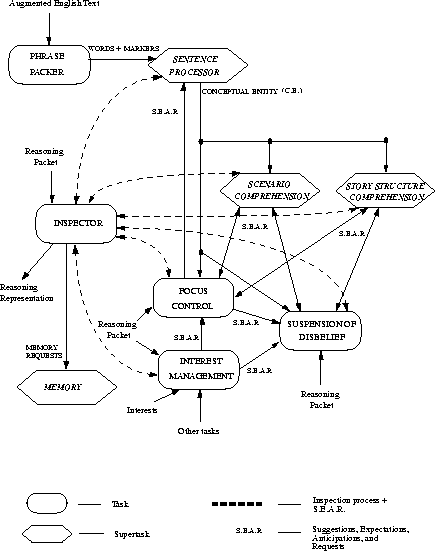 |
Storage is achieved simply by the creation of a new concept. When this occurs, the MOORE system automatically creates the links which join the new concept into the current semantic framework. There is no explicit processing needed in order to achieve storage.
Retrieval is the area where a speed-up is required. As a result, there are two forms of retrieval which is utilized by the implementation of ISAAC. First, all concepts are named and are retrievable by that name and by the words which point to the concept. As a result, if a reader encounters the word robot, any concepts which are tied to that word can be immediately retrieved from memory. At that time, a new instance of the concept will be created. Second, if a more general purpose retrieval is needed, for instance, if a concept needs to be retrieved via an indexed request concerning its attributes, then the spreading activation mechanism in MOORE is utilized. A memory request is posted to the MOORE system; elements of the request are activated in memory and allowed to spread through the semantic memory. When concepts achieve a certain level of satisfaction, they are returned to the process which requested the retrieval. In addition to the explicit cues which may be provided to the memory process, context activation also influences the retrieval process. Concepts which have recently been retrieved by the system retain their activation for a period of time which crosses into future retrieval cycles. This results in the history of the reasoner directly influencing the specific concepts which may be retrieved by any given request, thereby allowing the same memory request to generate a different set of memories based on the recent activity of the reasoner. This is manifested in human memory as well, a behavior known as priming. Consider what happens if I ask you to tell me the names of three Greek gods from mythology versus what will happen if I ask you the same question after you have read the synopsis for the Star Trek episode Who Mourns for Adonais? Since that episode involves Apollo, it is likely that the second set will include him due to the fact that he is more ``active'' in your memory.
Reminding is the only other memory task. Since MOORE is already an asynchronous memory model, reminding is achieved whenever a non-canceled memory request returns matches after the initial one is returned. The normal state, however, is to cancel requests as soon as a matching concept is found. This prohibits spontaneous reminding from occurring. This was a design decision based on the performance of the system with and without this ability. The model loses some ability as a result, of course; in particular, problem reformulation cannot occur via reminding, as discussed in Chapter 6. However, the efficiency benefits to the system outweighed this, especially given the fact that reading serves to constrain problem reformulation in such a way as to make the spontaneous reminding method less needed. In a creative understanding system outside of the reading domain, this issue would need to be addressed.